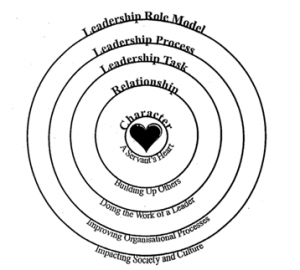Health - Trend Magazine originally published at Health - Trend Magazine
The process model of servant leadership

Dr. Don Page
Human resources are more important than the bottom line; we need to consider the human dimension in all our leadership and business decisions
— Wong and colleagues
TORONTO, ONTARIO, CANADA, April 21, 2022 /EINPresswire.com/ — According to The Wall Street Journal (Mitchell, 2022), “Several million workers who dropped out of the U.S. workforce during the Covid-19 pandemic plan to stay out indefinitely because of persistent illness fears or physical impairments, potentially exacerbating the labor shortage for years, new research shows.
About three million workforce dropouts say they don’t plan to return to pre-Covid activities—whether that includes going to work, shopping in person or dining out—even after the pandemic ends, according to a monthly survey conducted over the past year by a team of researchers. “
This finding is worrisome. It shows both the fear factor of the workers and the lack of emotional and social support at the work place.
No wonder servant leadership has become the new buzzword during COVID-19 and the post-pandemic world. Here are a few examples.
“Why servant leadership is more important then ever” according to Neale (2020) on Forbes.
“Employees did better if their boss exhibited ‘servant leadership’ during COVID-19,” according to The Economic Times (ANI, 2020).
“Servant leaders — leaders devoted to making the welfare and growth of their people the priority — are needed urgently for the post-pandemic world,” according to Chief Learning Officer (Campbell & Glener, 2021).
*Why Servant Leadership is Becoming the Leadership Style of the Future. Servant leadership is viewed as a more authentic approach to genuinely address the needs of the followers,” according to Athal (2021).
The recent paper on servant leadership by Wong and colleagues (in press) explains (a) why the bottom line is not everything, and why the most important and urgent need for adding the human dimension in managing people and doing business, and (b) how to practice servant leadership in a competitive world.
It all begins with a servant’s heart first followed by leadership competency as illustrated by the process model of servant leadership in this figure.
Dr. Don Page, the former Academic Vice-President of Trinity Western University, explain the concept of servant leadership as follows:
“The concept and practices of servant leadership was first developed by Greenleaf (1977). Servant leadership encompasses valuing the personal development of individual workers (Greenleaf, 1977; Spears, 1995). This approach is effective, because employees who feel valued are able to grow and make a useful contribution. When Robert K. Greenleaf wrote about the idea of serving or servant leadership in the 1970s, it was as an antithesis to the abuse of power that he saw in contemporary American leaders. It was presented as a cohesive philosophy aimed at creating a more caring society by redirecting the power of the leader away from selfish ambition to serving and respecting those whom they led. During his lifetime, and despite his tireless promotional efforts, the idea did not catch on as being a servant and a leader seemed to be a hopeless oxymoron, until it was realized that a leader would not be denigrated by have a serving function (Page, 2009).”
Here is a video clip by Larry Spears, president of Greenleaf Center for Servant Leadership, speaking about servant leadership.
Wong and colleagues conclude their paper with this recommendation:
“At present, the Russian-Ukraine war reminds us of how urgent is to have servant leaders on the world stage. Down through history, humanity has suffered immensely because of egotistic and ruthless dictators like Hitler and Stalin. We propose that ST holds the promise of better future because it serves to balance self-enhancement. The above literature review also suggests that the best possible leadership in turbulent times is a visionary competent leader who serves others with the twin power of faith and sacrificial love. Even though it may be difficult to implement SL, society is still better served if we strive towards this ideal. All things being equal, there is a better chance of organizational success with a servant leader and workers with a servant’s heart.”
Here is a video clip of recent talk on servant leadership by Dr. Paul Wong, President of the International Network on Personal Meaning.
Tim Yu
International Network on Personal Meaning
email us here
![]()
Health - Trend Magazine originally published at Health - Trend Magazine

 ,
,




